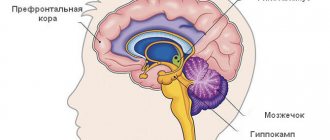- How to treat bulimia?
Bulimia is a neuropsychological disorder that is accompanied by eating disorders. The pathology is accompanied by periodic or frequent fluctuations in body weight. The disease is difficult to recognize, so patients can hide it for years.
Bulimia - what kind of disease?
Bulimia is a pathology in which the patient uncontrollably consumes food in excessive quantities. After eating, he has a desire to get rid of extra calories. For this purpose, he forcibly induces vomiting and abuses drugs with laxative effects. For this purpose, fasting or intense physical activity can be used.
The disease most often occurs in people aged 13-35 years. With bulimia, a person has a desire to eat high-calorie foods. After eating, the patient is relieved of it using various methods that negatively affect the state of health.
Diagnosis and treatment of bulimia
Diagnosis of this disease is quite simple. The diagnosis of bulimia can be made based only on changes in the patient's behavioral signs and appearance. If within two hours the patient cannot resist frequent and excessive consumption of food, and also completely loses control over himself during such attacks, then it is quite possible to talk about the presence of such a disease.
Treatment of bulimia is a rather lengthy process and requires an integrated approach. It includes work with a psychologist, drug therapy and some cognitive behavioral methods.
Psychotherapy for this disease helps to understand the cause that led to the occurrence of the disease and direct all means to fight it.
Cognitive behavioral therapy aims to identify and change patients' dysfunctional thoughts regarding their appearance and eating. This treatment also makes it possible to identify and correct anxious and negative thoughts, against which strong emotions arise that cause the progression of bulimia attacks.
Family therapy shows very good results in the treatment of bulimia. In such cases, recovery occurs much faster, because in any mental disorder, the support of loved ones plays a very important role.
Equally important is a competent combination of psychotherapeutic treatment and drug therapy, which will include the use of antidepressants. The most popular tablets for treating bulimia are Fluoxetine, which can reduce the frequency of bouts of overeating and dull the desire to get rid of food through vomiting or laxatives.
If bulimia provokes metabolic disorders in the body or digestive disorders, then in such cases serious diet therapy is used with the use of medications aimed at treating the developed pathologies.
Self-treatment of bulimia involves regular physical activity, long walks and other wellness procedures. However, this process is long and in any case requires the supervision of a psychologist.
Classification of bulimia
With bulimia, a person focuses on food, calories, and weight. Depending on the characteristics of behavior, several types of disorders are distinguished:
Bulimia nervosa. The disease is diagnosed in people aged 25-30 years. Pathology occurs in human psychological disorders. The disease appears with excessive psychological stress, frequent depression, and constant stress. When failure occurs, a person begins to uncontrollably eat food to combat stress. The nervous form of the disease appears in the absence or dissatisfaction in personal life, non-acceptance of one’s own appearance, and low self-esteem.
Pubertal bulimia develops in adolescence. It appears if the child does not love himself and his body. With hormonal changes, teenagers become sensitive and vulnerable. To improve their appearance, they disrupt the process of eating. In the pubertal form of the disease, uncontrolled eating is observed, which alternates with prolonged fasting.
Experts identify primary bulimia, in which an uncontrollable desire to eat food appears. After this, the person goes on a strict diet and experiences constant hunger. If he cannot tolerate it, then uncontrollable overeating begins, followed by feelings of guilt and induction of vomiting, as well as other attempts at cleansing.
Bulimia is identified as a consequence of anorexia. This disease is accompanied by not accepting food and refusing to eat it. But, anorexics may experience bouts of overeating, after which they refuse to eat at all for a long time.
The course of bulimia has two ways. The first of them is that after overeating, a person tries to get rid of calories using enemas, laxatives, and vomiting. In the second variant of the course of the disease, the patient does not empty the stomach of food. Weight control is carried out using strict diets. But, patients often break down and begin to eat food uncontrollably again, which leads to a worsening of the situation.
Causes of bulimia
Any eating disorder, including bulimia, is dangerous because in the long-term course of the disease, multiple physiological disturbances can occur. In addition, bulimia is often combined with other nervous and mental disorders, such as depression and suicidal thoughts.
Bulimia most often affects women, but men are also affected by this disease. Experts put the figure at 15% of bulimic men out of all those who sought help. However, it must be taken into account that men are less likely to seek help and may react aggressively to offers to receive psychotherapeutic treatment, so the actual number of patients with bulimia among men should be higher.
The causes of bulimia are not completely clear. Many researchers are guilty of double standards in the fashion industry: girls want to be like anorexic models, they develop a feeling of inferiority, which they try to eliminate by controlling their weight. At the same time, constant hunger strikes and strict diets cause the body to rebel, resulting in systematic, uncontrolled eating of food.
Other doctors note that a genetic predisposition to bulimia is also possible, and cases have been recorded in which children suffering from bulimia also developed this disease. However, in this case, it can be problematic to identify the root cause: the atmosphere in the family or a truly genetic factor.
The harm of bulimia is not in the fact of overeating, but in the fact that the eating process itself is disrupted. All body systems are vitally dependent on the supply of nutrients that it receives from food. With bulimia, it is absolutely impossible to call nutrition healthy; the situation is exactly the opposite.
Causes of bulimia
The disease develops under the influence of psychological and physiological factors. The second of these includes damage to the food center in the brain. Pathology is diagnosed in metabolic disorders - metabolic syndrome, insulin resistance. The causes of the disease are hormonal disorders - hypothalamic-pituitary insufficiency.
Most often, bulimia develops for psychological reasons. The disease is diagnosed in adolescents from wealthy families who have pretentious and ambitious family attitudes. Such children develop an inferiority complex and fear of misbehaving, which will adversely affect the honor and dignity of the family. The patients themselves claim that the problem of overeating appears due to a lack of volitional qualities. Bulimia is most often diagnosed in young women who are unhappy with their appearance.
How do you get bulimia?
Gradually, gluttony turns into a way to reward yourself and relieve psycho-emotional stress.
Overeating becomes regular. There is a fear of getting fat. To compensate for food abuse, forced cleansing of the stomach and intestines is used - provocation of vomiting, abuse of laxatives. A cyclical pattern appears—following overeating comes a period of strict diets and physical activity. Bulimia can manifest itself over several decades, sometimes intensifying, sometimes subsiding.
Causes
For some people, going through a very stressful situation, such as being fired from a job or divorcing a spouse, is enough. An attack of gluttony is triggered due to high nervous tension and the inability to cope with it. However, before this event, factors predisposing to the disease are present in the life of patients:
- genetic – the rate of satiety, the activity of neurotransmitters and the functioning of the hunger center in the brain are determined by special genes
- biological – in people with diseases of the endocrine and nervous systems, appetite may be pathologically increased
- personal – people with low self-esteem, suspiciousness, and anxiety are prone to bulimia
- family – eating disorders develop in children whose parents are prone to anxiety and depression and make excessive demands
- cultural – the idea of a thin body as a sign of beauty is more actively promoted in large cities and industrialized countries
Mechanisms of formation
The development of bulimia can be distinguished at a psychological and physiological level. In the first case, a cyclical change in emotions and behavior is determined. At first, restrictions on food intake create a feeling of unsatisfied need, tension increases because of this, and a breakdown occurs—overeating. In the process of eating food, a feeling of comfort and slight euphoria appears. Afterwards, unpleasant physical symptoms arise (abdominal pain, nausea), and the experience of guilt and self-hatred increases. To get rid of unpleasant emotions and poor health, patients induce vomiting, take laxatives, and exhaust themselves with diets. This behavior allows you to return to your previous emotional state.
At the physiological level, eating behavior is regulated by neurotransmitters - active substances that affect various brain structures, increasing or decreasing the feeling of hunger, satiety, joy, depression and other conditions. With bulimia, there is often a deficiency of serotonin and increased activity of glutamic acid. Therefore, the disorder is accompanied by increased appetite, depression and anxiety.
Several mediator systems are involved in the regulation of eating behavior.
Thus, serotonin causes a feeling of fullness, so high levels of serotonin lead to cessation of food intake. The duration of food intake is apparently also regulated by other mediators, for example polypeptides (cholecystokinin, etc.). Adrenergic substances can either enhance or suppress food cravings, depending on the state of the body. Opioid and dopaminergic substances provide the feeling of pleasure from food.” W. Egras. Textbook of psychiatry. Chapter 9. Eating Disorders
Symptoms of bulimia
The disease can be determined by physiological symptoms. When the disease appears, patients refuse to notice its signs and diligently hide them from others.
Behavioral signs
In case of pathology, patients are diagnosed with the appearance of corresponding symptoms. You can identify a bulemic person by his behavior. A person eats food in excessive quantities and chews it poorly. During the meal period, a person is in a hurry and therefore swallows it in pieces. After eating, the patient goes to the toilet to forcefully vomit. Patients become secretive and withdrawn. He shows signs of psychological disturbances.
Physiological signs
Patients often have fluctuations in body weight, which becomes noticeable to others. Patients complain of weakness and excessive fatigue even when performing usual activities. The pathological process is accompanied by a decrease in energy and a deterioration in general well-being.
Patients are often diagnosed with inflammatory processes in the pharynx and throat in the form of pharyngitis and tonsillitis. The disease is accompanied by disturbances in the functioning of the digestive system. In pathology, metabolic disorders can be diagnosed. If a person with bulimia regularly vomits, this can lead to dental diseases. A common symptom of the pathology is increased salivation, as the functioning of the salivary glands is disrupted. With bulimia, signs of dehydration appear. The pathology is accompanied by dermatitis and sagging skin.
What are the dangerous consequences of bulimia?
Complications of this condition may include the following:
- chronic dehydration - systematic artificial cleansing of the stomach and the use of diuretics affects it: a deficiency of calcium, sodium, chlorine, potassium develops, leading to heart failure;
- metabolic disorders: the level of cortisol, the stress hormone, increases, the production of female hormones deteriorates, which causes disruption of the regular cycle;
- malfunctions of the digestive system - gastritis, ulcers, enzyme deficiency;
- problems with the mucous membranes of the mouth and esophagus - due to cleansing the body artificially on a regular basis, they are constantly inflamed, ulcers may appear in the esophagus, which can degenerate into oncological formations;
- teeth suffer - for the same reason as mucous membranes.
- deterioration of the condition of nails and hair, the latter thin out, fall out, become brittle and lifeless, and become dull;
- disruptions in the functioning of the nervous and cardiovascular systems - anxiety, changes in biorhythms leading to insomnia, etc.
Dangerous gluttony. Who is at risk for bulimia and how to prevent it Read more
Complications of bulimia
In the absence of timely treatment of the disorder, patients are diagnosed with the development of serious complications. If the pathology continues for a long time, mumps may develop. Female representatives experience the development of gynecological disorders - the menstrual cycle is disrupted and amenorrhea develops. The pathology is accompanied by diseases of the digestive system:
- Flatulence;
- Enterimtami;
- Constipation;
- Flatulence.
With bulimia, patients develop chronic forms of gastritis. Intestinal peristalsis is disrupted in various ways during regular elimination of food. Some patients were diagnosed with an inflammatory process on the mucous membrane of the esophagus. The pathological process causes various diseases of the rectum. When the disorder occurs, the functioning of the liver and pancreas is impaired.
A long course of bulimia leads to disturbances in the functioning of the nervous system. The patients were diagnosed with the development of diabetes mellitus. A complication of the pathology is hypothyroidism. The disease can lead to adrenal insufficiency. Bulimia causes the development of metabolic syndrome. The appearance of disorders in water and electrolyte balance was observed in patients.
Bulimia leads to serious complications, so when the first signs appear, it should be treated immediately.
Treatment for bulimia
Therapy for the disease must be comprehensive, which will have a positive effect on the result. The patient is first recommended to undergo diagnostics to determine the cause of the pathology. The patient is advised to visit a psychiatrist who will interview him. This will allow the doctor to determine the psychological causes of the disorders.
If physiological causes of pathology are suspected, the use of laboratory and instrumental techniques is recommended. To determine the degree of water-salt imbalance, a biochemical blood test is recommended. Using ultrasound, abnormalities in the functioning of internal organs are determined.
How to treat bulimia?
Treatment of the disease should be aimed at eliminating its causes. For this purpose, various psychological methods are used. If disturbances in the functioning of internal organs are diagnosed, the patient undergoes drug treatment for the pathology and diet therapy is used.
The patient is recommended to take vitamins, which will help strengthen the immune system and restore the functioning of internal organs. If necessary, the patient may be prescribed antidepressants. In especially severe cases, patients are prescribed physiotherapeutic procedures.
Treatment methods for bulimia
Bulimia is a serious pathological process that requires the simultaneous use of several therapeutic methods:
- Working with a psychologist. With bulimia, people's psyche is disturbed. When consulting with a psychologist or psychotherapist, the specialist asks many leading questions with the help of which the cause of the disease is determined. After this, the psychologist develops a method for eliminating these causes. When self-esteem is low, methods of persuasion, collective opinion, etc. are used. The specialist conducts individual work with the patient. Thanks to group classes in which the patient listens to the stories of recovering patients, awareness of the danger of the disease comes. This technique allows the patient to realize that he needs treatment.
- Diet therapy. When treating a disease, the patient is strictly prohibited from following a strict diet. A nutritionist develops very tasty and healthy food for the patient, which does not negatively affect his appearance and health. The specialist teaches the person fractional nutrition and the rules of eating. This allows a person to learn to enjoy food.
- Drug therapy. If the cause of the disease is frequent depression and stressful situations, then the use of antidepressants is recommended. The drugs are used to treat the disease when complications occur. For digestive system disorders, probiotics, diuretics, etc. are prescribed. They can prescribe medications to combat disturbances in the functioning of the ENT organs and the cardiovascular system. The choice of a specific medicine and the development of a treatment regimen is carried out by a doctor. Previously, the patient must undergo a comprehensive diagnosis to determine the existing complications of the disease.
All treatment methods should be used in combination and selected individually for the patient, which will have a positive effect on its effectiveness.
Self-treatment of bulimia at home
In the initial stages of the disease, you can try to get rid of it yourself. If a person adheres to the recommendations of specialists, he will be able to eliminate the worsening of the disease. The patient is advised to adhere to the rules of a healthy lifestyle.
Patients, especially the fairer sex, need to learn to love their body and accept their appearance. In case of nervous strain, you should try not to eat food, especially sweet, salty, high-calorie foods. Consuming alcoholic beverages is strictly prohibited. If a person is experiencing depression or a stressful situation, he is recommended to seek help from a psychotherapist.
If a woman has problems with excess weight, then she should contact a nutritionist who will develop a special menu for her. Patients are strictly prohibited from using drugs for weight loss. Taking medications with diuretic and laxative effects is allowed only as prescribed by a doctor.
Self-treatment of bulimia requires the patient to go through several stages. At the very first of them, a person must assess his behavior and well-being, as well as determine whether he has a disease. Once the patient identifies the symptoms of bulimia, he needs to urgently begin treatment. Therapy for the disease can last a long time. For the patient to recover, he needs to stabilize his psycho-emotional state.
At certain stages of treatment, patients note an improvement in their condition and therefore believe that recovery has occurred. Some patients feel as if they will never recover. But, if a person has a strong desire, then he will overcome the disease.
Treatment of bulimia in the clinic
The difficulty of treating bulimia lies in the fact that most patients refuse to notice the symptoms and do not recognize the course of the disease in themselves. In this case, treatment of the pathology should be carried out in a specialized clinic. Experienced specialists will help a person understand the existing problem, so he will agree to undergo a course of treatment. In the clinic, therapy for the disease is carried out not only by a psychotherapist, but also by other specialists.
Highly effective psychological techniques are used to combat bulimia. You can overcome the disease by using:
- Breathing exercises. This technique enhances self-control and ensures patient peace of mind. Gymnastics is widely used to combat the disease in combination with other methods.
- Transactional analysis. The psychotherapist uses a technique that is based on three “I”s - child, adult, parent. The specialist determines the impact of these conditions on human behavior.
- Psychoanalysis. The specialist deeply analyzes childhood experiences and traumas against which the disease can develop. After this, a treatment regimen is developed aimed at eliminating this cause.
- Cognitive behavioral psychotherapy. This is a comprehensive method of treating pathology, which consists of conducting trainings and lectures, and keeping a diary. When using this technique, a person becomes aware of himself and evaluates behavior from the outside. The method is widely used if a person refuses to admit that he has a disease.
For bulimia, a psychotherapist works with the patient's relatives and friends. He is engaged in adjusting relationships in the family, which allows the patient to feel important. Parents and relatives must prove that they love the patient and provide him with all possible support. A therapist can teach them how to do this correctly.
Bulimics are their own nutritionists, as they know almost everything about the calorie content of food, the amount of protein, fat and carbohydrates consumed. But, with food addiction, nutritionists help them develop a very tasty menu that will not contribute to weight gain. Experts will talk about the advantages and disadvantages of various products and the need for a proper diet. By constantly working with a specialist, the patient develops the correct nutritional culture.
If bulimia has complications, then the clinic uses drug therapy to treat it. For serious psychological disorders, it is recommended to take pills whose action is aimed at reducing appetite:
- Afobazole;
- Sibutramine;
- Goldline;
- Meridia, etc.
The treatment regimen is developed only by the doctor, taking into account the individual characteristics of the human body. Self-administration of medications is strictly prohibited if you have a healthy psyche, as withdrawal syndrome will lead to a worsening of the condition.
If a person constantly induces vomiting, this leads to inflammation of the throat. To combat this complication, clinic specialists prescribe various sprays and tablets. For sore throat, it is recommended to use Tantum Verde, Grammidin, Ingalipt, Strepsils, Kamenton, etc. Prescription of drugs is done by an ENT doctor.
The clinic employs experienced gastroenterologists who treat diseases of the digestive system caused by bulimia. If a person has taken laxatives, then his withdrawal syndrome is accompanied by diarrhea or constipation. To combat them, it is recommended to take probiotics:
- Biphilia;
- Atcipola;
- Acylacta, etc.
For heartburn, sour belching and pain in the stomach, Almagel, Gastal, Gastrofarm are prescribed. If unpleasant symptoms do not go away after taking the drugs, then a detailed diagnosis of the gastrointestinal tract is carried out using ultrasound, probing and other instrumental techniques. This allows you to identify the disease and prescribe effective treatment.
The advantage of treating bulimia in a clinic is its comprehensive approach. Doctors of various specializations work here, which allows us to develop a therapeutic course aimed at eliminating the causes and symptoms of the disease.
Thanks to the promotion of a healthy lifestyle, a slim body, fitness and ideal body proportions, some girls find flaws in themselves and compare themselves with the ideal bodies they see on the Internet. The pathological desire to lose weight, get rid of cellulite, get closer to the ideal and be like someone leads to neuropsychiatric disorders associated with such behavior. Along with anorexia, bulimia occurs among these girls, which is treated not only by a nutritionist, but also by a psychotherapist and psychiatrist. Bulimia nervosa is a very serious disease, and it is not always possible to overcome it on your own. Starving girls feel intense hunger, which they try to satisfy by eating too much food, then after a bout of gluttony, they provoke vomiting to get rid of the food they have eaten, and they can also drink laxatives by the handful.
Against the background of such a physical state, the psyche also suffers, because eternal dissatisfaction with oneself, irritability and the desire to get rid of what one has eaten due to anger at one’s figure actually affects deep-seated psychological problems.
If anorexia is a refusal to eat, then bulimia is a ravenous hunger, which patients try to get rid of through gluttony.
Another symptom of bulimia is an obsession with nutrition; there are a lot of contradictions: you want to eat something sweet, but at the same time a feeling of shame and anger arises, because patients deny themselves this. These intense mental experiences are treated with the help of a psychotherapist, not just with the help of a dietician.
Treatment for bulimia in Strogino is also carried out by a good gastroenterologist in a medical clinic, since problems with the gastrointestinal tract arise due to constant induction of vomiting, hunger and overeating.
Social networks are one of the main reasons for the development of bulimia, since beautiful girls, who are icons for teenagers, cause psychological problems, especially if the girl is predisposed to gain excess weight. This is the main area that needs to be given increased attention when treating bulimia. By working through psychological problems and increasing self-esteem, you can overcome the disease.
Not only girls, but also boys suffer from increased control over the food they consume. Unlike patients suffering from anorexia, people with bulimia, as a rule, have a normal or average physique, and it is for this reason that family and friends may not always notice abnormalities in the patient. Problems with the gastrointestinal tract must be treated by a gastroenterologist in Strogino, since gluttony interspersed with fasting leads to stomach distension, disruption of the intestines and the entire digestive tract, not to mention the appearance of acne, skin defects, menstrual irregularities, kidney problems, heart and many other organs.
Prognosis for bulimia
The prognosis for pathology directly depends on the psycho-emotional state of the patient and the selection of treatment methods. If a patient undergoes a therapeutic course in a clinic under the supervision of highly qualified specialists, then he manages to get rid of the disease.
If the patient did not seek medical help in a timely manner or was prescribed ineffective treatment, the prognosis will be unfavorable. A person experiences the development of serious complications in the form of disturbances in the functioning of the gastrointestinal tract, cardiovascular system, and ENT organs. The most serious adverse effects include gastric rupture, cardiovascular failure, and internal bleeding. Unstable psycho-emotional state and constant mental depression often become causes of suicide.
Bulimia is a serious disease in which the patient's eating patterns are disrupted. This causes deviations in a person’s mental and physical health. If the disease is treated regularly and the patient’s psychological disorders are correctly corrected, this ensures a favorable prognosis. That is why it is recommended that when the first symptoms of disorders appear, you seek help from qualified specialists and undergo treatment in a clinic.











